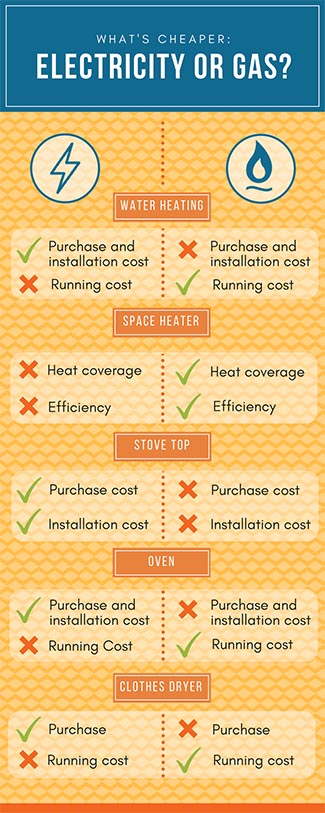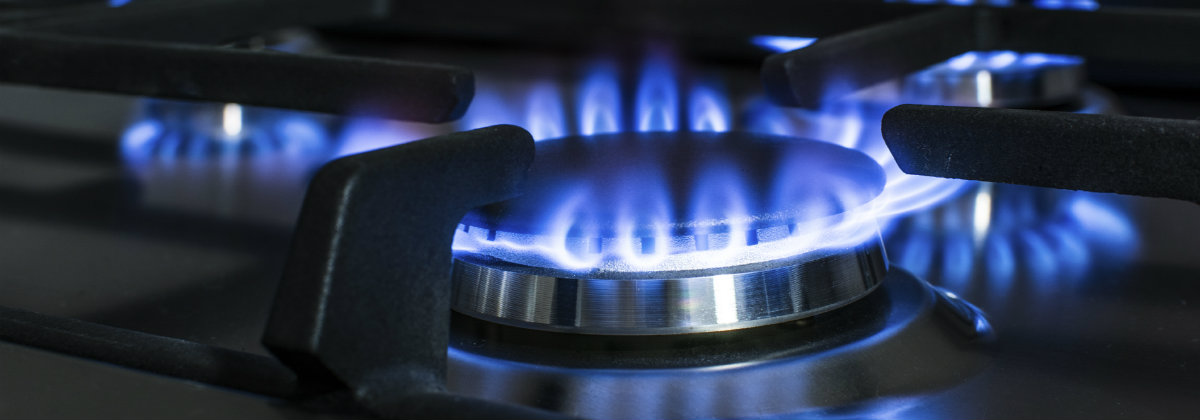For the millions of Australians home with access to both electricity and gas, each fuel type has its own advantages. But which product is cheaper, and which one is better for you to use? Find out if electricity or gas is cheaper in this Canstar Blue guide.
On this page:
Electricity vs. gas in Australia
Households have two options when it comes to powering their homes – gas and electricity. Electricity is the more common option, with virtually every home connected to the energy grid. However, despite the push to move to electric-only buildings, as of 2020 close to 70% of Australian homes still used mains or bottled gas.
Gas isn’t quite as powerful as electricity: it takes 3.6 megajoules of gas to equal one kilowatt-hour of electricity. However, how electricity and gas is charged differs, and the rates you’ll pay for each will also depend on your distributor, retailer and choice of plan. As a general guide we’ve calculated the average usage rates in major cities below.
Electricity costs by city
Electricity customers are charged per kilowatt-hour (kWh) of electricity consumed, with households also needing to pay a ‘daily supply charge’ to cover the distributor’s cost of transporting the electricity to your home. This typically costs between 75c and $1.30 per day, depending on your location and the tariff type.
As stated, the rates you pay for electricity will depend on your state and distribution network. The typical electricity usage rates for each major city are as follows:
- Sydney: 34.7c/kWh
- Melbourne: 25.9c/kWh
- Brisbane: 31.5c/kWh
- Adelaide: 44.9c/kWh
- Perth: 30.8c/kWh
- Hobart: 29.5c/kWh
- Darwin: 28.1c/kWh
- Canberra: 25.1c/kWh
Source: www.canstarblue.com.au – 08/04/2024. Average electricity usage rates are based on single-rate, non-solar only plans on Canstar’s database, available for an annual usage of 4,378 kWh with the exception of Perth which is based on the Synergy Home Plan (A1) tariff and Darwin which is based on the government regulated rate.
Keep in mind that the usage rates listed are relatively standard for a ‘single-rate’ tariff. Those customers on time-of-use or block tariffs may be charged notably different rates.
Cheap electricity deals
Here are some of the cheapest published deals from the retailers on our database that include a link to the retailer’s website for further details. These are products from referral partners†. These costs are based on the Ausgrid network in Sydney but prices may vary depending on your circumstances. This comparison assumes general energy usage of 3911kWh/year for a residential customer on a single rate tariff. Please use our comparison tool for a specific comparison in your area. Our database may not cover all deals in your area. As always, check all details of any plan directly with the retailer before making a purchase decision.
Here are some of the cheapest published deals from the retailers on our database that include a link to the retailer’s website for further details. These are products from referral partners†. These costs are based on the Citipower network in Melbourne but prices may vary depending on your circumstances. This comparison assumes general energy usage of 4000kWh/year for a residential customer on a single rate tariff. Please use our comparison tool for a specific comparison in your area. Our database may not cover all deals in your area. As always, check all details of any plan directly with the retailer before making a purchase decision.
Here are some of the cheapest published deals from the retailers on our database that include a link to the retailer’s website for further details. These are products from referral partners†. These costs are based on the Energex network in Brisbane but prices may vary depending on your circumstances. This comparison assumes general energy usage of 4613kWh/year for a residential customer on a single rate tariff. Please use our comparison tool for a specific comparison in your area. Our database may not cover all deals in your area. As always, check all details of any plan directly with the retailer before making a purchase decision.
Here are some of the cheapest published deals from the retailers on our database that include a link to the retailer’s website for further details. These are products from referral partners†. These costs are based on the SA Power network in Adelaide but prices may vary depending on your circumstances. This comparison assumes general energy usage of 4011kWh/year for a residential customer on a single rate tariff. Please use our comparison tool for a specific comparison in your area. Our database may not cover all deals in your area. As always, check all details of any plan directly with the retailer before making a purchase decision.
Natural gas costs by city
Natural gas customers are charged per megajoule (MJ) of natural gas consumed, alongside the fixed ‘daily supply charge’, which generally costs between 22 and 85 cents per day depending on your location and distribution network.
Typical gas usage rates are:
- Sydney: 3.6c/MJ
- Melbourne: 3.4c/MJ
- Brisbane: 5.3c/MJ
- Adelaide: 3.6c/MJ
- Perth: 14.8c/Unit*
- Hobart: 5.1c/MJ
- Canberra: 3.7c/MJ
Source – www.canstarblue.com.au – 08/04/2024. Average gas usage rate based on summer rates of single-rate plans on Canstar’s database, available for an annual usage of 24,856MJ with the exception of Hobart which is based on Solstice Energy’s Standard Residential Tariff and Aurora Energy. *Average gas usage rate for Perth based on summer rates of single-rate plans on Canstar’s database, available for an annual usage of 6,300 Units (Unit defined as 3.6 MJ per WA.gov)
The above rates assume a single rate tariff . However, it is common for gas tariffs to operate on a ‘block-rate’ basis, whereby the rate decreases incrementally as you use more gas.
Cheap gas deals
Gas Plans Compared in VIC
Here are some of the cheapest gas deals on our database for VIC. These estimated annual costs are based on the Australian Gas Network in Melbourne and yearly gas usage of 29,830MJ, but prices will vary depending on your circumstances. We show one product per retailer, listed in order of lowest estimated cost. This table includes products from referral partners†. Our database may not cover all deals in your area, and please check retailer websites for up to date information.
Gas Plans Compared in NSW
Here are some of the cheapest gas deals on our database for NSW. These estimated annual costs are based on the Jemena Gas Network in Sydney and yearly gas usage of 18,542MJ, but prices will vary depending on your circumstances. We show one product per retailer, listed in order of lowest estimated cost. This table includes products from referral partners†. Our database may not cover all deals in your area, and please check retailer websites for up to date information.
Gas Plans Compared in WA
Here are some of the cheapest gas deals on our database for WA. These estimated annual costs are based on the ATCO Network in Perth and yearly gas usage of 7,672 (units), but prices may vary depending on your circumstances. We show one product per retailer, listed in order of lowest estimated cost. This table includes products from referral partners†. Our database may not cover all deals in your area, and please check retailer websites for up to date information.
Gas Plans Compared in SA
Here are some of the cheapest gas deals on our database for SA. These estimated annual costs are based on the Australian Gas Network in Adelaide and yearly gas usage of 11,875MJ, but prices will vary depending on your circumstances. We show one product per retailer, listed in order of lowest estimated cost. This table includes products from referral partners†. Our database may not cover all deals in your area, and please check retailer websites for up to date information.
Gas Plans Compared in QLD
Here are some of the cheapest gas deals on our database for QLD. These estimated annual costs are based on the Australian Gas Network in Brisbane and yearly gas usage of 6,842MJ, but prices will vary depending on your circumstances. We show one product per retailer, listed in order of lowest estimated cost. This table includes products from referral partners†. Our database may not cover all deals in your area, and please check retailer websites for up to date information.
Read more: Electricity and gas providers
Electricity vs. gas costs compared
From an initial glance, gas may seem cheaper than electricity to run, but it’s not as clear cut as that: a kilowatt is a bigger unit than a megajoule, meaning the final running costs are slightly different. Here’s a quick guide to the most common appliances that are available as either electricity or gas-powered.

Electric vs. gas: Hot water running costs
Hot water systems can run on either gas or electricity. However, the running costs are more likely determined by the type of hot water system you have, rather than what powers it.
Like most appliances, gas hot water systems are cheaper to run, but are more expensive to purchase; electric hot water systems are cheaper to buy initially, but cost slightly more to run. Hot water systems generally also have an energy rating, allowing you to get more of an idea of how much energy each model consumes before you commit to buy.
Electric vs. gas: Heating running costs
Gas heaters are generally able to heat up small-to-medium sized rooms quicker and more efficiently than electric heaters. The downside is that they’re generally more expensive to purchase, and may require a flue to help expel fumes in some cases.
In comparison, electric heaters are usually more widely available, and come in a range of sizes and types. This allows you to find something potentially more suitable for the space you’re trying to heat, which may help you get more value in exchange for the higher running costs.
Read more: Gas heaters vs electric heaters: Which is best?
Electric vs. gas: Stove running costs
Cooktops are another household appliance that are available as either an electric or gas model. Gas models tend to be thought of as a better option for cooking as they heat up quicker than electric types, in addition to having a slightly lower running cost. However, electric stoves are generally cheaper to purchase and install, making it an argument of short-term savings versus long-term savings.
Read more: Gas vs electric oven running costs
Electricity vs. gas appliance purchasing costs
While gas appliances are slightly cheaper to run, they also generally come with a higher price tag, which can outweigh the potential long-term savings.
For example, a brand-new electric oven can cost as little as $400, whereas an entry-level gas oven will cost you closer to $1,100, meaning the initial expense may cause some hesitancy from some. The good news is that appliance prices are dependent on retailers, your choice of brand and which models you’re looking to purchase.
If you’re an avid cook, or want a well-heated home in winter, then it may work out cheaper overall to install gas appliances. Of course, this will also depend on whether you already have a natural gas connection at your home.
If you aren’t connected to the gas main, you’ll incur an additional fee, and will have to pay two daily supply charges if you have both an electricity and natural gas connection. This means the cheaper gas running costs may be quickly negated by additional fees and work needed to get your house ready.
For more detailed info on buying power-saving whitegoods, check out our guide on energy-efficient appliances.
How much does a natural gas connection cost?
If you don’t have a pre-existing natural gas connection at your home, you’ll need to organise a connection with your local gas distribution network. The price for gas connections can be anywhere from a few hundred to a few thousand dollars, depending on the network and the complexity of the work that needs to be performed.
If you’re nowhere near a mains network, your only option may be LPG. Also keep in mind that if you are renting, you will need your landlord’s permission before installing any gas connections or appliances.
To see if you are eligible for a mains natural gas connection, contact your gas distributor.
Electricity vs. gas: Pros and cons
While the costs may be the determining factor, electricity and gas each come with advantages and disadvantages. The below table explores the pros and cons of both fuel types.
| Fuel Type | Pros | Cons |
|---|---|---|
| Electricity |
|
|
| Gas |
|
|
Determining what’s cheaper for your household can be tough to calculate, particularly when you need to factor in installation costs, daily usage rates and even new appliance costs. While gas generally has a slightly cheaper running cost, gas appliances and installing a gas connection can quickly outweigh the initial savings.
Is gas cheaper than electricity?
Whichever option ends up cheaper and more suitable is entirely dependent on your situation, household location and general preferences. If you’re a distance away from an electricity grid, gas may be your only option. In comparison, those who already have access to the gas main may find opting for gas appliances cheaper in the long run.
Depending on your state and personal circumstances you may be eligible for energy rebates and concessions that can help with the cost of your power bills and making the switch to electric. Be sure to research your rebate options to see what you can save.
It’s always best to do your research before buying any new appliances or looking to install new connections. And if you get stuck, you can always check out our ratings for gas and electricity providers to see what’s out there and what else to consider.
Original author: Jared Mullane




Share this article